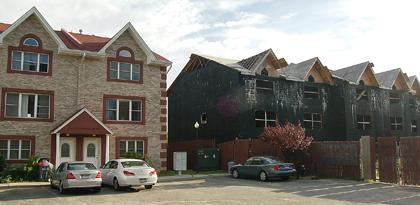By Stephen Stirling
Tucked away among College Point’s scenic Manhattan views and quiet suburban life is a ghost town.
Along the community’s northern shore, where Flushing Bay meets the Long Island Sound, is Edgewater Estates — a collection of 115 luxury, two-family homes in various states of completion.
The planned community, at the corner of Ninth Avenue and 115th Street, has slowly been taking shape since 2002, but sometime during the last year construction crews went silent. A stroll through the area reveals a grim picture: shattered windows and graffiti pock-mark half-finished buildings that tower over unmanned construction equipment, just feet from where children play outside identical row homes that were completed.
“I’m not sure what happened,” said Aaron Palmetto, who walks his dog by the development site every day. “I didn’t really want this to come here in the first place, but the least they could have done is finish or tidy up after themselves.”
According to the U.S. attorney for the Eastern District of New York, between 2001 and 2003 the developer responsible for the project allegedly perpetrated an ambitious scheme geared at defrauding one of the largest banks in the country.
Benton Campbell, U.S. attorney for the Eastern District, said 60-year-old Thomas Kontogiannis and eight other men were indicted on conspiracy and bank fraud charges in June for allegedly attempting to finance Edgewater Estates and another development in Brooklyn by executing straw purchases on the homes planned for the development to obtain multiple mortgages on each property.
About a third of the development was never completed and shows no signs of getting underway anytime soon.
Calls to the development’s sales office, which has a banner outside that reads “two-family homes for sale,” went to an answering machine.
A resident who lives in one of the completed homes said she knew something had gone awry earlier this year.
“They don’t tell us anything, but I’d hear the windows breaking when kids were back there throwing rocks,” said the resident, who did not wish to be identified said. “There were less and less workers, then none. They stopped fixing things. It’s gotten worse and worse. It’s not good.”
If convicted, Kontogiannis faces up to 30 years in prison and the forfeiture of several properties and money under his name.
Marine pathologist Dr. James Cervino and his brother Steven had been contracted to work on the property by Kontogiannis to help in fixing a myriad of state Department of Environmental Conservation violations accrued by the company during construction.
“They started running out of money. As I’m working they’re firing people,” Steven Cervino, who runs TNS Restoration, said. “Then one of the workers came up to me and asked how he could sue [Kontogiannis]. They were putting the deeds of the houses in the employees’ names.”
The Cervinos spent months on the property and said they completed tens of thousands of dollars of work to rehabilitate the coastline surrounding the property after Kontogiannis’ company had illegally tried to bridge an inlet between two portions of the development drawing fines from the state DEC.
James Cervino said that over the last several months, much of their work has been undone and anyone who purchased the property would have to complete $300,000 to $600,000 to meet state DEC standards.
For Palmetto, that day cannot come soon enough.
“It’s an eyesore,” Palmetto said. “It’s bad enough we’ve got to deal with developers destroying our community, but at least most of them finish their projects.”
Reach reporter Stephen Stirling by e-mail at sstirling@cnglocal.com or by phone at 718-229-0300, Ext. 138.



































